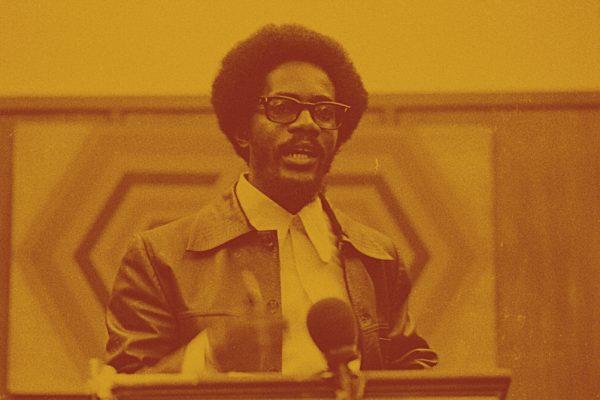
During an anti-impeachment rally in December 2015, one of the leaders of the effort to oust Dilma Rousseff, congressman Eduardo Cunha, is lampooned for his own corruption, which is reputed to include stealing millions from the state-owned oil company Petrobras. / Photograph: Tomaz Silva/Agência Brasil
Two weeks ago, after recording what was perhaps her last official address and signing a net-neutrality addendum to Brazil’s landmark 2014 Internet civil rights legislation (the Marco Civil da Internet), Dilma Rousseff was temporarily removed from the office of president of Brazil. For a period of up to six months, the Senate will deliberate on whether to remove her permanently from office or reinstate her to finish her term, depending on if she is found guilty of a “crime of responsibility” for fiscal inconsistencies in the national budget. Meanwhile Vice-President Michel Temer, acting as interim president, has shuffled the country’s ministerial line-up and declared a series of policy reversals, primarily in an effort to restore national and international confidence in the country as a stable and business-friendly environment.
But despite the celebratory mood conveyed by Brazil’s corporate media, the country’s future is entirely uncertain. Not only is it far from assured that the Senate will vote at the end of the process to permanently suspend Rousseff, or that the Supreme Court will uphold the impeachment. The bigger uncertainty is whether the interim Temer administration will meet the minimum conditions to govern or be accepted as legitimate by a sufficient percentage of the population. For too many Brazilians at every level of the social ladder, the Rousseff impeachment seems transparently political, seeking to remove an unpopular but democratically elected president on thin, procedural grounds under the banner of fighting corruption. An unelected administration composed of several politicians themselves implicated in corruption is now beginning to carry out policies that the Brazilian public would have a hard time accepting at the ballot box. Internationally, the bizarre spectacle of the impeachment joins other recent power grabs by conservative forces in Latin America, notably in Paraguay and Honduras, which have sought to manipulate public institutions to facilitate elite interests.
In the name of anti-corruption, Brazil has installed an interim president barred from running for office because of illegal campaign contributions.
Brazil has been in a widening political crisis for months. As the impeachment process has proceeded, it has only worsened. A few days before the impeachment vote, Brazilian political institutions nearly went off the rails. The previous speaker of the lower house of Congress, Eduardo Cunha, a radio evangelist and leader of the impeachment process, was finally removed from office by the judiciary on charges that he stole millions from the state’s oil company, Petrobras. Waldir Maranhão, who replaced Cunha as interim speaker, then annulled Rousseff’s impeachment by personal fiat. He argued that the congressional sessions that approved the impeachment were conducted inappropriately, and were thus invalid. The president of the Senate responded by saying he would ignore the annulment and go ahead with the vote. The interim speaker then reversed the annullment of the impeachment proceedings.
The Senate then voted to formally suspend Rousseff, and, as expected, her vice-president quickly reorganized the administration, pulling together a number of conservatives and centrists in a cabinet united by ideas of fiscal and social conservatism—and of course distributing posts to members of the parties key to his coalition. He has signaled a clear right-wing shift in several policy areas, and has promised domestic peace and economic recovery. And so as to leave no doubt as to the direction of his government, he abolished several ministries, including those of human rights, racial equality, culture, and women. It is the first time in over thirty years that there has not been a woman minister in Brazil. The cabinet has also drawn criticism for its near-absence of Afro-Brazilians, who constitute approximately half of the country’s population but are often excluded from its power elite. On top of this, the administration has signaled that it would like to see the privatization of airports and utilities, the rolling back of indigenous lands, grants of foreign access to oil reserves, a reduction in expenditures for public housing, and an increase to the retirement age. Temer's team has also proposed a constitutional amendment that would effectively eviscerate the country’s public health system.
Temer now faces a race against time. The decisive vote on whether to permanently remove Rousseff from office is in six months, and it is likely to be very close. If as many as two senators of the fifty-five who voted to impeach last week change their vote, the final vote will fail. The tacit assumption for political actors in Brazil is that if Temer’s government delivers on its promises of reducing economic and political turbulence, the impeachment will probably stand. If not, the impeachment will be overturned. This will have nothing to do with the merits (or lack thereof) of the corruption charges leveled against Rousseff.
As unpopular as Rousseff has been recently, Temer and the conservative politicians behind the impeachment have a tremendous image problem at home and, increasingly, abroad. The optics of their cause have often been poorly managed, from the hooliganism of right-wing demonstrators at rallies to a picture that went viral of a wealthy white couple who brought their black nanny to an impeachment protest. The image seemed to confirm what many suspect has been at the core of anti-Rousseff protests: a barely hidden class resentment at the redistributive policies enacted during the last dozen years of Workers’ Party rule. If one is listing the conservatives’ PR gaffes, one cannot forget the video showing one of the lawyers behind the impeachment being moved by the spirit to speak of a holy crusade against the “republic of snakes.” And worst of all was the telecast of the impeachment vote itself when, among many other absurdities, one of the congressmen dedicated his vote against Rousseff to Carlos Ustra, one of the chief torturers of the 1964–85 military dictatorship (and who is believed to have overseen some of Rousseff’s torture when she was a young political prisoner).
To add to Temer’s woes, some Latin American countries have refused to recognize the interim government, and Ernesto Samper, the secretary-general of the Union of South American Nations, has been sharply critical of the impeachment, stopping just short of calling it a coup and stating that Rousseff remains the legitimate leader of Brazil.
But Temer’s biggest problem is domestic. It is simply very difficult for many Brazilians to accept the legitimacy of a process that, in the name of anti-corruption, has installed an interim president who is currently barred from running for office because of illegal campaign contributions, and who has selected several ministers who are themselves under investigation for corruption. In fact, a large number of those who voted for impeachment have been named in the sweeping government corruption investigation called Operation Carwash (discussed at length in my last article). Just this week recordings were leaked in which Romero Jucá, vice-president of Temer’s party and interim planning minister, is heard discussing Dilma’s removal as a way to stop corruption investigations from reaching him and his party. As Glenn Greenwald has written, the recordings provide “proof for virtually every suspicion and accusation impeachment opponents have long expressed”—namely, that the impeachment process has less to do with clean government than installing conservative politicians. Jucá has subsequently announced that he will step down from his cabinet position. It remains to be seen what other fallout there will be.
There remains a considerable opposition to the impeachment. A significant parcel of the Brazilian population (organized civil society, unions, social movements, intellectuals, and large segments of the working poor) views it as a coup, an attempt by Rousseff’s foes to distract from their own misdeeds. This opposition is likely going to increase if Temer’s government carries out the cutbacks it has promised. If progressive actors were split under Rousseff because of disappointment with her recent policies, they will more easily come together in opposition. Because one of the lessons of the last months has been that laws and institutions matter less than political brawn, it is likely that discontentment will manifest first and foremost in the streets. And because the capacity for disturbance will be seen as the opposition’s only card, there will be little hesitation to do so. It is impossible to predict Brazil’s future, but it will certainly include polarization and disquiet.








